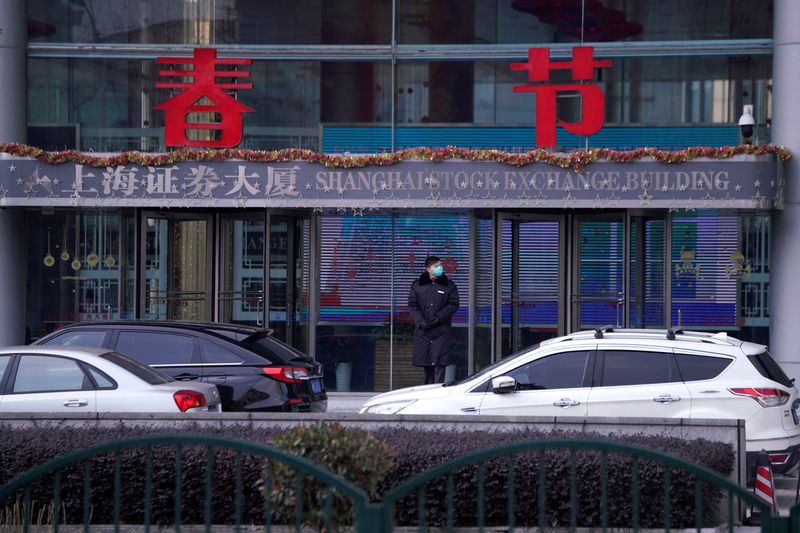By Jason Xue and Summer Zhen
SHANGHAI/HONG KONG (Reuters) -China's stock exchanges on Tuesday said major quant fund Lingjun Investment had broken rules on orderly trading and barred it from buying and selling for three days, as part of wider regulatory efforts to revive market confidence.
Orders from Lingjun to dump stocks in early trade on Monday coincided with rapid declines in the benchmark indexes, the Shenzhen and Shanghai stock exchanges said, adding they would restrict the hedge fund's trading until Feb. 22.
One of China's biggest quant funds, Lingjun manages more than 60 billion yuan, the company says on its website.
Lingjun apologised for the negative impact in a statement on its website on Wednesday. The firm said it "holds long-term bullish views on Chinese stocks and will stick to long positions," adding it will review the problems existing in transactions.
Chinese quant funds, which use derivatives and data-driven computer models, have already suffered from a steep market sell-off this year and government curbs on short-selling.
China's blue-chip index dropped to five-year lows early this month.
"Regulators are sending a clear signal that money should be handed to managers who profit from long-term investment, rather than swift trades," Yang Tingwu, vice general manager of Tongheng Investment, said.
He said the punishment could accelerate redemptions in quant funds as investors would ask: "Who's next?"
A hedge fund manager who declined to be named said a three-day trading halt was not a huge problem for Lingjun, but was a further blow to confidence in quant funds as regulatory scrutiny intensifies.
BROKEN RULES
The Shanghai and Shenzhen bourses said in identical statements on Tuesday that Lingjun's share dumping via mutiple products violated rules that stipulate programme-trading must not endanger exchange systems or normal trading order.
Lingjun dumped a combined 2.57 billion yuan ($357.4 million) in A-shares in a minute between 9:30 a.m. and 9:31 a.m. on Monday, the exchanges revealed.
The exchanges said they would strengthen monitoring and analysis of quantitative, especially high-frequency trading.
Such trading "has obvious advantages over small investors in terms of technology, information and speed" and could at times contribute to market volatility, the exchanges said.
As regulators seek to revive market confidence, China's securities watchdog, led by newly installed chairman Wu Qing, held a series of seminars with market participants who proposed tighter scrutiny.
Chinese quant funds already attracted the attention of regulators last year after criticism, including from smaller investors and long-only funds, of a sector able to profit from share price falls and volatility.
The industry has also been blamed for its role in causing the boom-and-bust of Chinese small-caps.
China's quant hedge funds totalled 1.26 trillion yuan at the end of 2021, according to the latest official data. The industry has grow rapidly over the last few years, and has attracted foreign players such as Two Sigma and Winton.

($1 = 7.1936 Chinese yuan renminbi)
($1 = 7.1905 Chinese yuan renminbi)